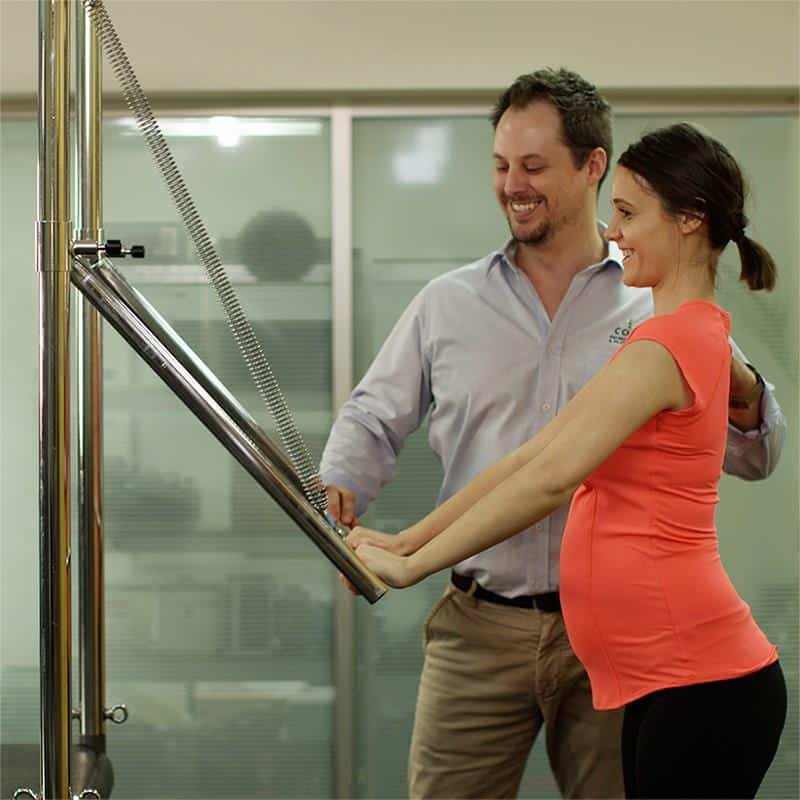During pregnancy, women may experience a number of complaints & symptoms, many of these can be helped with regular physiotherapy treatment. The most common symptoms that women may suffer from are:
low back pain
Low back pain is a very common complaint for women during their pregnancy, particularly in the third trimester when their centre of gravity has shifted. Low back pain during pregnancy can be treated with hands on physiotherapy & postural education, the use of back supports, home exercises & a Pilates based exercise program can also help to alleviate any symptoms that you may be suffering from.
pelvic floor weakness/urinary incontinence
During pregnancy, your body releases the progesterone hormone, this relaxes and weakens the pelvic floor in preparation for giving birth. Pelvic floor muscles can become strained and weakened during pregnancy and childbirth, leading to Pelvic floor dysfunction and incontinence problems. Physiotherapists can provide strengthening exercises and a Pilates based exercise program throughout your pregnancy to strengthen these muscles, this helps to reduce the muscle weakness that can be caused by childbirth.
sacroiliac joint pain
The Sacroiliac joints (SIJ’s) are located at the very bottom of your back. The pain created by these joints is often one-sided and may be concentrated in your buttocks (Sturesson et al 1997). During pregnancy, your body releases extra hormones, allowing the connective tissues in your body to relax, your muscles are then able to stretch enough to give birth. As a result the SIJ ligaments and muscles can become overly mobile, creating excessive movement in these joints, this can lead to low back pain.
Symptoms that may be experienced during pregnancy include:
- Present swelling and/or inflammation over your joints
- Difficulty lifting your legs
- Pain when pulling your legs apart
- Difficulty transferring weight throughout your pelvis and legs
- Pain in your hips and/or restriction of hip movement
- Transferred nerve pain down your legs
- Malalignment of pelvic and/or back joints
- Difficulty when sitting and/or standing
- Awareness of an audible ‘clicking’ sound coming from your pelvis
Physiotherapists can provide strengthening exercises during pregnancy to improve stability as well as hands on therapy to realign the pelvis and reduce pain.
sciatica
The sciatic nerve is a long nerve that runs from your lower back to the back of your legs and feet. Pressure on the sciatic nerve during pregnancy can lead to backache or pain over other areas in your body. Sometimes persistent or chronic pressure to the sciatic nerve can result in weakness in your legs or surrounding areas, symptoms can also include, numbness or even tingling.
Your Physiotherapist can provide you with manual hands on treatment as well as stretching and home exercises that can help to relieve these symptoms, reducing any level of discomfort that you may be experiencing.
carpal tunnel syndrome
Carpal tunnel syndrome is caused due to an increase in fluid throughout pregnancy that creates swelling around the channel of nerves (the carpal tunnel) in your wrist. This swelling can lead to symptoms such as:
- Tingling
- Pain
- Numbness
- Lack of coordination in fingers and hands
Physiotherapists can provide different forms of treatment that include, mobilisation, soft tissue techniques, stretching and strengthening exercises, this will help to relieve your symptoms. Specific braces can be worn at night and during certain activities to help control inflammation around the wrist, minimising these symptoms. If you require treatment for any of the symptoms that have been listed above (depending on the severity of your issue), you can make a booking with a Physio at any one of our practices across Adelaide. You can press this link to find a location near you
https://www.corephysio.com.au/our-locations/
